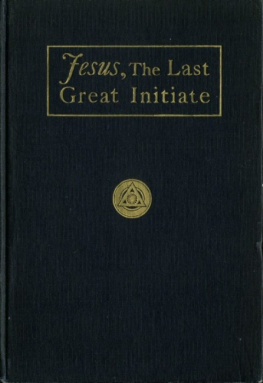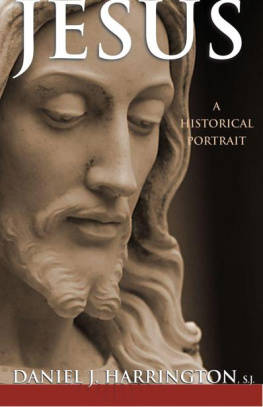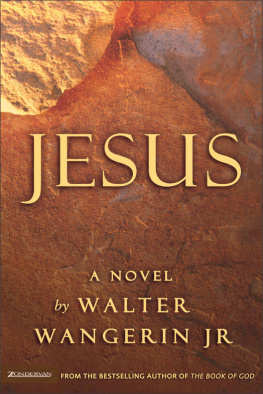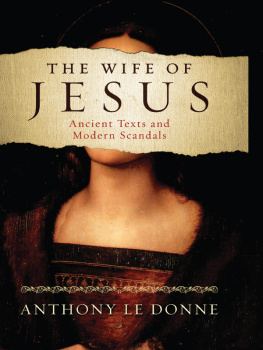Edouard Schure - Jesus, The Last Great Initiate: An Esoteric Look At The Life Of Jesus
Here you can read online Edouard Schure - Jesus, The Last Great Initiate: An Esoteric Look At The Life Of Jesus full text of the book (entire story) in english for free. Download pdf and epub, get meaning, cover and reviews about this ebook. year: 2008, publisher: CreateSpace Independent Publishing Platform, genre: Religion. Description of the work, (preface) as well as reviews are available. Best literature library LitArk.com created for fans of good reading and offers a wide selection of genres:
Romance novel
Science fiction
Adventure
Detective
Science
History
Home and family
Prose
Art
Politics
Computer
Non-fiction
Religion
Business
Children
Humor
Choose a favorite category and find really read worthwhile books. Enjoy immersion in the world of imagination, feel the emotions of the characters or learn something new for yourself, make an fascinating discovery.
- Book:Jesus, The Last Great Initiate: An Esoteric Look At The Life Of Jesus
- Author:
- Publisher:CreateSpace Independent Publishing Platform
- Genre:
- Year:2008
- Rating:5 / 5
- Favourites:Add to favourites
- Your mark:
- 100
- 1
- 2
- 3
- 4
- 5
Jesus, The Last Great Initiate: An Esoteric Look At The Life Of Jesus: summary, description and annotation
We offer to read an annotation, description, summary or preface (depends on what the author of the book "Jesus, The Last Great Initiate: An Esoteric Look At The Life Of Jesus" wrote himself). If you haven't found the necessary information about the book — write in the comments, we will try to find it.
Edouard Schure: author's other books
Who wrote Jesus, The Last Great Initiate: An Esoteric Look At The Life Of Jesus? Find out the surname, the name of the author of the book and a list of all author's works by series.
Jesus, The Last Great Initiate: An Esoteric Look At The Life Of Jesus — read online for free the complete book (whole text) full work
Below is the text of the book, divided by pages. System saving the place of the last page read, allows you to conveniently read the book "Jesus, The Last Great Initiate: An Esoteric Look At The Life Of Jesus" online for free, without having to search again every time where you left off. Put a bookmark, and you can go to the page where you finished reading at any time.
Font size:
Interval:
Bookmark:

Criticism on the life of Jesus during the past century has been greatly to the fore. A complete account of this criticism will be found in the luminous sketch made by M. Sabatier, in which the entire history and present state of this investigation are given. Sufficient for the moment to refer to the two principal phases supplied by Strauss and Renan, with the object of determining the new point of view I now wish to offer.
Departing from the philosophical school of Hegel to ally himself with the critical and historical one of Bauer, Strauss, without denying the existence of Jesus, endeavored to prove that his life, as related in the Gospels, is a myth, a legend created by popular imagination, to meet the necessities of a rising Christianity, and in accordance with Old Testament prophecy. His position, a purely negative one, but which he defended with great skill and erudition, has been found true in certain details, but quite untenable in its entirety and essential elements. It has, in addition, the grave defect of explaining neither the character of Jesus nor the origin of Christianity. The life of Jesus, according to Strauss, is a planetary system without a sun. One merit, however, must be granted this work, that of having transferred the problem from the ground of dogmatic theology to that of textual and historical criticism.
M. Renan's Vie de Jesus owes its brilliant success to its lofty, sthetic, and literary qualities, as well as to the boldness of the writer, the first who dared make the life of the Christ a problem of human psychology. Has he solved the problem? After the dazzling success of the book, the general opinion of all serious critics has been in the negative. The Jesus of M. Renan begins his career as a gentle dreamer, an enthusiastic but simpleminded moralist; he ends it as a violent thaumaturgist, devoid of all idea of reality. "In spite of all the precautions of the historian," says M. Sabatier, "it is the march of a healthy mind in the direction of madness. The Christ of M. Renan hovers between the calculations of ambition and the dreams of a seer." The fact is that he becomes the Messiah without wishingalmost without knowingit. He permits himself to be given this name merely to please the apostles and to fulfil the popular wish. It is not with so feeble a faith that a true prophet creates a new religion and changes the soul of the earth. The life of Jesus, according to M. Renan, is a planetary system illumined by a pallid sun devoid of vivifying magnetism or creative heat.
How did Jesus become the Messiah? That is the primordial question, the solution of which is essential to the right understanding of the Christ; it is also that before which M. Renan hesitated and turned aside. M. Thodore Kein saw that this question must be boldly faced (Das Leben Jesu, Zrich, 1875, 3rd edition). His life of Jesus is the most remarkable that has appeared since M. Renan's. It throws on the question all the light given by texts and history esoterically interpreted. But the problem is not one capable of being solved without the aid of intuition and esoteric tradition.
It is by means of this esoteric light, the inner flame of all religions, the central truth of all fruitful philosophy, that I have attempted to reconstruct along its main lines, the life of Jesus, taking into account whatever previous historical criticism has hitherto cleared and prepared the ground. No need to define what I mean by the esoteric point of view, the synthesis of Religion and Science. Concerning the historical and relative value of the Gospels, I have taken the three synoptical Gospels (those of Matthew, Mark, and Luke) as a basis, and that of John as the arcanum of the esoteric teaching of the Christ, at the same time acknowledging the subsequent language and form, and the symbolical tendency of this Gospel.
All four Gospels, which should be mutually examined and verified, are equally authentic, though from different claims. Those of Matthew and Mark are precious gospels of letter and fact; therein are to be found the public deeds and words of the Christ. The gentle Luke affords a glimpse of the mystery-meaning beneath the poetical legend-veil; it is the Gospel of the Soul, of Woman, and of Love. Saint John unfolds these mysteries; in his Gospel are to be found the inner depths of the doctrine, the secret teaching, the meaning of the promise, the esoteric reserve. Clement of Alexandria, one of the few Christian bishops who held the key to universal esoterism, rightly named it the Gospel of the Spirit. John has a profound insight of the transcendent truths revealed by the Master, and a great facility in presenting them. Accordingly, his symbol is the Eagle, whose wing cleaves the firmament, and whose flaming eye encompasses the depths of space.

Footnotes;
A solemn period of the world's destiny was approaching; the sky was overshadowed with darkness and filled with sinister omens.
In spite of the efforts of the initiates, polytheism, throughout Asia, Africa, and Europe, had terminated only in the downfall of civilization. The sublime cosmogony of Orpheus, so gloriously chanted by Homer, had not been attained, and the only explanation possible is that human nature found great difficulty in maintaining a certain intellectual altitude. For the great spirits of antiquity, the gods were never anything more than a poetical expression of the subordinated forces of Nature, a speaking image of its inner organism; it is as symbols of cosmic and animic forces that these gods live indestructible in the consciousness of humanity. This diversity of gods and forces, the initiates thought, was dominated and penetrated by the supreme God or pure Spirit. The principal aim of the sanctuaries of Memphis, Delphi, and Eleusis had been precisely the teaching of this unity of God with the theosophical ideas and moral discipline resulting therefrom.
But the disciples of Orpheus, Pythagoras, and Plato failed before the egoism of the politicians, the sordidness of the sophists, and the passions of the mob. The social and political decomposition of Greece was the consequence of its religious, moral, and intellectual decomposition. Apollo, the Solar Word, the manifestation of the supreme God and the supra-terrestrial world, is silent. No more oracles, no more inspired poets are to be heard! Minerva, Wisdom, and Foresight, veils her countenance in presence of her people converted into Satyrs, profaning the mysteries, and insulting the gods in Aristophanic farces on the stage of Bacchus. The very mysteries themselves are corrupted, for sycophants and courtesans are admitted to the Eleusinian rites. When soul becomes blunted, religion falls into idolatry; when thought becomes materialized, philosophy degenerates into scepticism. Thus we see Lucian, poor microbe born from the corpse of paganism, turn the myths into ridicule, when once Carneades had denied their scientific origin.
Superstitious in religion, agnostic in philosophy, egoistical and divided in politics, reeling under anarchy and fatally abandoned to despotism. Greece had become sadly changed from the time when she transmitted the science of Egypt and the mysteries of Asia in immortal forms of beauty.
If there was one who understood what the world needed, and who endeavored to restore this need by an effort of heroic genius, that one was Alexander the Great. This legendary conqueror, initiated, as was also his father, Philip, into the mysteries of Samothrace, proved himself even more of an intellectual son of Orpheus than a disciple of Aristotle. Doubtless, the Achilles of Macedonia, who, accompanied by a mere handful of Greeks, crossed Asia as far as India, dreamed of universal empire, but not after the fashion of the Csars, by oppression of the people, and the destruction of religion and unfettered science. His grand idea was to reconcile Asia and Europe by a synthesis of religions, supported by scientific authority. Impelled by this thought, he paid homage to the science of Aristotle, as he did to Minerva of Athens, the Jehovah of Jerusalem, the Egyptian Osiris, and the Hindu Brahma, recognizing, as would a veritable initiate, an identical divinity and wisdom beneath these differing symbols. This new Dionysus possessed a broad sympathy and mighty prophetic insight. Alexander's sword typified the last flash of the Greece of Orpheus, illumining both East and West. The son of Philip died in the intoxication of victory and the glorious accomplishment of his dream, leaving the shreds of his empire to selfish and rapacious generals. But his thought did not die with him; he had founded Alexandria, where Oriental Philosophy, Judaism, and Hellenism were to be fused in the crucible of Egyptian esoterism, until the time might be ripe for the resurrection word of the Christ.
Next pageFont size:
Interval:
Bookmark:
Similar books «Jesus, The Last Great Initiate: An Esoteric Look At The Life Of Jesus»
Look at similar books to Jesus, The Last Great Initiate: An Esoteric Look At The Life Of Jesus. We have selected literature similar in name and meaning in the hope of providing readers with more options to find new, interesting, not yet read works.
Discussion, reviews of the book Jesus, The Last Great Initiate: An Esoteric Look At The Life Of Jesus and just readers' own opinions. Leave your comments, write what you think about the work, its meaning or the main characters. Specify what exactly you liked and what you didn't like, and why you think so.







